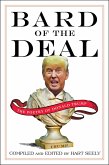A fantastic comic-book collaboration between the artist Rosanna Bruno and the poet Anne Carson, based on Euripides's famous tragedy
A NEW YORK TIMES BEST GRAPHIC NOVEL OF 2021
Here is a new comic-book version of Euripides's classic The Trojan Women, which follows the fates of Hekabe, Andromache, and Kassandra after Troy has been sacked and all its men killed. This collaboration between the visual artist Rosanna Bruno and the poet and classicist Anne Carson attempts to give a genuine representation of how human beings are affected by warfare. Therefore, all the characters take the form of animals (except Kassandra, whose mind is in another world).
A NEW YORK TIMES BEST GRAPHIC NOVEL OF 2021
Here is a new comic-book version of Euripides's classic The Trojan Women, which follows the fates of Hekabe, Andromache, and Kassandra after Troy has been sacked and all its men killed. This collaboration between the visual artist Rosanna Bruno and the poet and classicist Anne Carson attempts to give a genuine representation of how human beings are affected by warfare. Therefore, all the characters take the form of animals (except Kassandra, whose mind is in another world).
Dieser Download kann aus rechtlichen Gründen nur mit Rechnungsadresse in A, D ausgeliefert werden.









